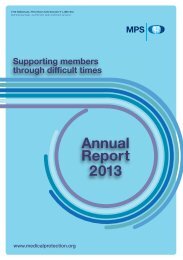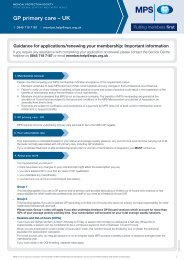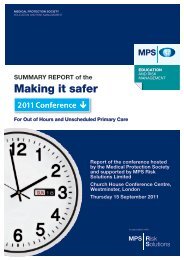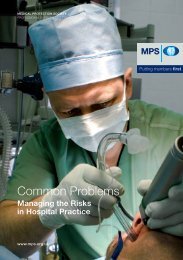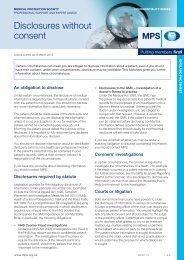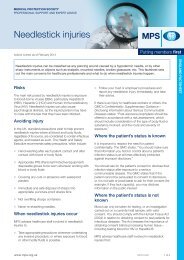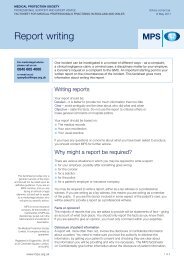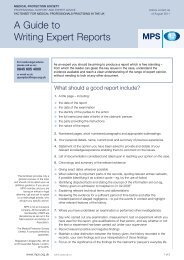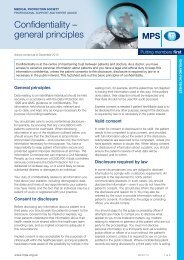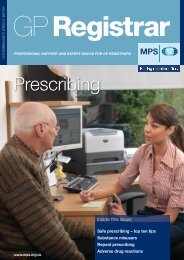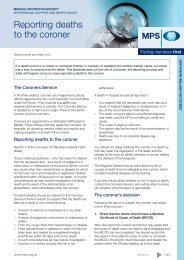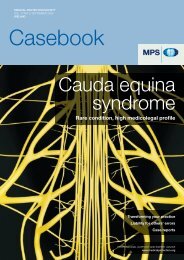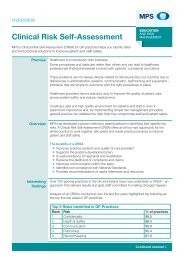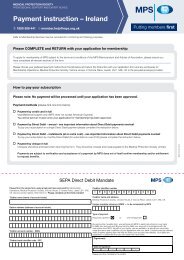View an interactive PDF of this edition - Medical Protection Society
View an interactive PDF of this edition - Medical Protection Society
View an interactive PDF of this edition - Medical Protection Society
- No tags were found...
Create successful ePaper yourself
Turn your PDF publications into a flip-book with our unique Google optimized e-Paper software.
12MEDICOETHICAL NEW DOCTOR | VOLUME 6 | ISSUE 1 | 2013 | UNITED KINGDOM www.mps.org.ukInformativeDOCTORPaternalisticm<strong>an</strong>aged to fracture his pelvis. ECT wasnew at that time, <strong>an</strong>d medical opinionwas divided on whether a relax<strong>an</strong>t<strong>an</strong>aesthetic should be used. 5In the subsequent legal action,the court was invited to decide betweenthe two competing medical schools<strong>of</strong> thought – relax<strong>an</strong>t or no relax<strong>an</strong>t.The court said it was not competent todecide on a medical issue. The judgein that case said that: “A doctor is notguilty <strong>of</strong> negligence if he has acted inaccord<strong>an</strong>ce with a practice accepted asproper by a responsible body <strong>of</strong> medicalmen skilled in that particular art.”This has been tweaked a bit overthe years, but the ‘Bolam test’ or‘Bolam st<strong>an</strong>dard’, also called the ‘PeerPr<strong>of</strong>essional Accept<strong>an</strong>ce’ or ‘Reasonabledoctor’ test, remains the yardstick.Hippocrates wrote that doctorsshould: “Continue with diligence to keepabreast <strong>of</strong> adv<strong>an</strong>ces in medicine.”In 1711 Alex<strong>an</strong>der Pope cautioned usto: “Be not the first by whom the neware tried, nor yet the last to laythe old aside.” Neither ethics nor thelaw requires us to be the best doctor inthe world, but we do need to attain <strong>an</strong>dmaintain that level <strong>of</strong> skill in what we dothat would attract peer support.Shared decision making“Doctor’sorders”Passive PATIENT ActiveREFERENCES1. Schloendorff v <strong>Society</strong> <strong>of</strong> New York Hospital (1914)2. NHSLA, Risk M<strong>an</strong>agement H<strong>an</strong>dbook (2012)3. Gillick v West Norfolk <strong>an</strong>d Wisbech Area Health Authority (1985)4. Donoghue v Stevenson (1932)5. Bolam v Friern Hospital M<strong>an</strong>agement Committee (1957)SharedDecisionMaking“Patient’schoice”JusticeThere are three elements to Justice:■■■Distributive justice – fair distribution<strong>of</strong> limited healthcare resources■■ ■Rights-based justice – respect forpeople’s rights, such as prohibition<strong>of</strong> discrimination■■■Legal justice – respect for the law.On <strong>an</strong> individual patient level,there are some obvious elements to‘Justice’– for example, not discriminatingagainst patients on the basis <strong>of</strong> theircolour, race, religion, etc; but c<strong>an</strong> werefuse to perform cardiac surgery ona patient because they smoke? Is thatdiscrimination – punishing the patientfor not stopping – or a fair medicaljudgment based on their increased risk<strong>of</strong> complications at <strong>an</strong>d after surgery?More broadly, we do our best tomaintain a focus on the patient infront <strong>of</strong> us, but we are aware <strong>of</strong> theneed to bal<strong>an</strong>ce that patient’s rights<strong>an</strong>d needs against the need for <strong>an</strong>equitable allocation <strong>of</strong> healthcare funds<strong>an</strong>d resources. Who decides whatis ‘equitable’? The ethical principle <strong>of</strong>Justice imposes a moral obligation todecide fairly between competing claims.Dr Nisselle is a senior consult<strong>an</strong>tat MPS Educational Services.He c<strong>an</strong> be contacted atpaul.nisselle@mps.org.ukLOOKING FOR EVIDENCE FORYOUR ePORTFOLIO?MPS is committed to education <strong>an</strong>dtraining. As well as helping you providethe best care for your patients, we w<strong>an</strong>tto support your development. That iswhy we have developed two onlinelearning modules on the topics coveredin <strong>this</strong> article, so that you c<strong>an</strong> downloada certificate <strong>of</strong> completion as evidence<strong>of</strong> your learning for your ePortfolio.What to do next….■■Once you’ve read <strong>this</strong> article, simplygo to www.mps.org.uk/e-portfoliowhere you c<strong>an</strong> register for theE-learning platform■■You’ll need your membership detailsto register <strong>an</strong>d log on■■Once logged on, you will be able toaccess the modules highlighted onthe home page■■You c<strong>an</strong> complete the modules at atime that suits you■■Download your certificate <strong>of</strong>completion <strong>an</strong>d <strong>an</strong>y supporting notes■■Other modules on a wide r<strong>an</strong>ge<strong>of</strong> subjects c<strong>an</strong> also be accessedthrough the E-learning platformTo learn more visit MPS’s website■■Access the MPS library <strong>of</strong>factsheets, <strong>this</strong> includes detailedinformation on the law aroundconsent <strong>an</strong>d confidentiality –www.medicalprotection.org/uk/factsheets■■Visit the h<strong>an</strong>dbooks <strong>an</strong>d bookletssection, to read more aboutconsent <strong>an</strong>d the ethical mazethat is modern medicine – www.medicalprotection.org/uk/advice<strong>an</strong>d-publications/booklets-<strong>an</strong>dh<strong>an</strong>dbooks.



